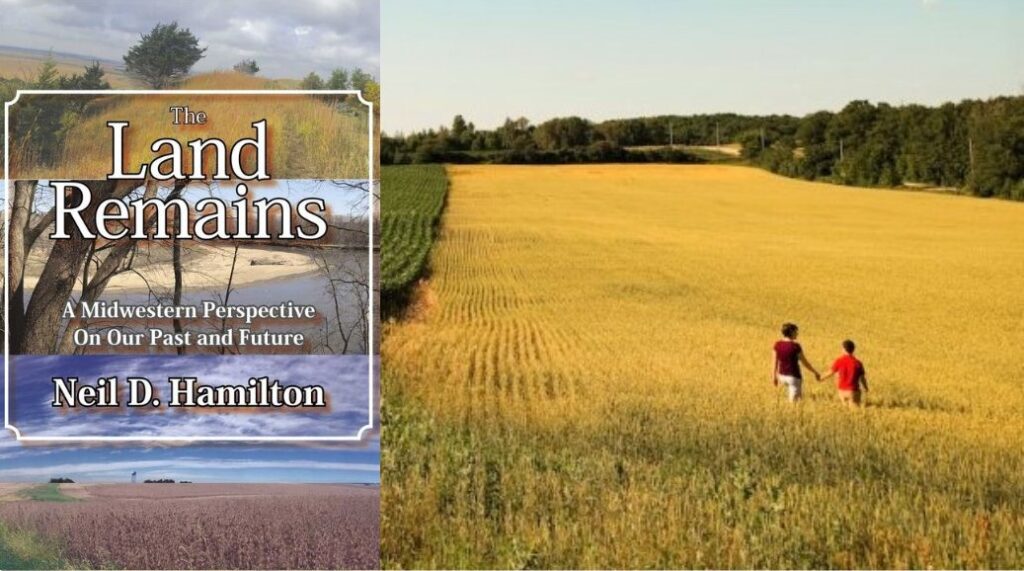Neil Hamilton’s book changed my mind about Iowa’s voluntary environmental standards

contributed photo The Land Remains” by Neil Hamilton makes a persuasive case against voluntary conservation standards.
Roughly four decades of work in conservation in Iowa did not prepare me for all I might draw from Professor Neil Hamilton’s book on soils, “The Land Remains.” I was especially surprised to find myself reexamining long-held beliefs in how best to approach soil and water protections.
This is in part due to Hamilton’s qualifications to write this book. He is a well-known professor emeritus of agricultural law at Drake University and a long-time board member of Iowa Natural Heritage Foundation. He was an early supporter of the land trust movement and he’s an Adams County farm kid who still manages Sunstead Farm in Dallas County with his wife. I’ve known Neil as a colleague and friend for years.
It is also due to Hamilton setting aside space throughout the book to hear from his family farm’s back forty (acres). He writes in the voice and from the perspective of the farm’s land. Sounding homespun and a tad scholarly, this “speaker” breaks new ground in explaining what’s happened to Iowa soils and why.
We have yet to unite as a state to effectively address the needs of our water and soil. That ongoing division seems to help feed the hate-mongering pervasive in our policy, politics and lives today.
As one of many ag engineering students in the late 1970s, I can say we didn’t know then all we know today about the impact of ag systems on land and water. We learned to move water from land to stream. Now knowledge has shifted to seeing relationships among soil health, water, erosion, tile lines, rooftops, pavement, slopes/topography and links to nitrogen and phosphorous – all vital aspects of “conservation engineering.”
But policy hasn’t shifted. We have few meaningful protections for our soil and surface waters of the agricultural landscape. The result? We send our topsoil downstream at rates we can’t replenish, traveling with wasted water, nitrogen and phosphorous. That nitrogen and phosphorous morph from “nutrients” to “pollutants” once they arrive at our waterways and lakes.
All Iowans should share responsibility for health of our soils and surface waters. Yet we stand divided in terms of who MUST care for the soil and waters and who is NOT required to do so. Urban lands and waters are regulated, but we rely on voluntary action in agriculture. As Hamilton notes, that’s “codified in the law.” If we cannot come together to protect these essential elements of lives and livelihood, what hope do we have for agreement on the other critical issues facing our state and nation?
In “The Land Remains,” Hamilton shows well-constructed standards help us meet societal goals. This is the point in the book where Hamilton changed my mind about relying on voluntary action. I kept wanting to believe it possible. But Hamilton convinced me otherwise. He maintains NO standards amount to an “anti-government ideological stance” that will “prove unworkable.” He cites numerous examples of rules in society we must obey (speed limits, car seats, etc.) and notes with no regulations, we assign the issue “a low priority.”
Elsewhere, Hamilton demonstrates how we got to the point where “personal liberty” drives our agricultural policy, while shared responsibility takes a backseat. We cannot continue to let our faith in individual rights overwhelm our need to also share in supporting community goods – like soil, water, air. But I maintain considering the poor quality of our surface waters, the erosion of our soils, and the division of our people, the strictly voluntary approach has already “proved unworkable.” It’s a sensibility – and a piece of Iowa code — in desperate need of revisiting.
In the end, Hamilton’s voice is expansive and deep – I have only touched on one topic here, but he provided arguments that influenced me. Read the book to learn more about the possibilities ahead, the responsibilities at hand and what we must all do to ensure that “The Land Remains” here in Iowa, stewarded by all of us, for the good of us all.
“The Land Remains” by Neil Hamilton is published by Ice Cube Press.
——
Pat Boddy of Urbandale is President of 900 Views LLC, a communications consulting firm. She is the former director of Polk County Conservation, former deputy and interim director of the Iowa Department of Natural Resources, and senior partner emeritus of RDG Planning and Design in Des Moines.


